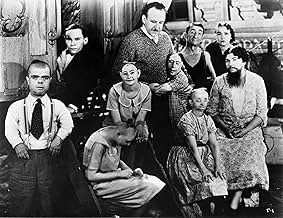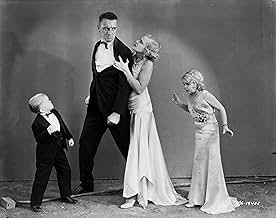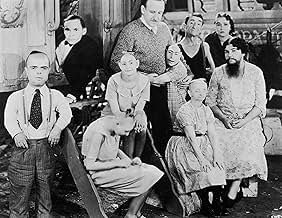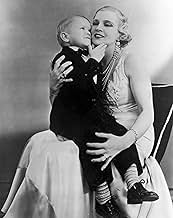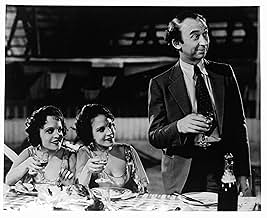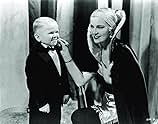A circus' beautiful trapeze artist Cleopatra agrees to marry Hans the leader of side-show performers, but Hans' deformed friends discover that she is only marrying him for his inheritance. S... Read allA circus' beautiful trapeze artist Cleopatra agrees to marry Hans the leader of side-show performers, but Hans' deformed friends discover that she is only marrying him for his inheritance. So they seek revenge.A circus' beautiful trapeze artist Cleopatra agrees to marry Hans the leader of side-show performers, but Hans' deformed friends discover that she is only marrying him for his inheritance. So they seek revenge.
- Awards
- 2 wins & 1 nomination
Roscoe Ates
- Roscoe
- (as Rosco Ates)
Prince Randian
- The Living Torso
- (as Rardion)
Storyline
Did you know
- TriviaThe on-screen romance between Hans and Frieda was very subdued because the roles were being played by real life brother and sister Harry Earles and Daisy Earles.
- GoofsAt 43:40 when Cleo tosses the wine at Angeleno, she is standing in front of him, but the wine she throws comes from the far right side of the frame.
- Quotes
Freaks: We accept you, one of us! Gooble Gobble!
- Alternate versionsReissue prints included a two-and-a-half minute written prologue about historical interpretations and contemporary studies of "misshapen misfits." These same prints remove the MGM Lion (the studio having disowned the film for many years).
- ConnectionsEdited into Histoire(s) du cinéma: Le contrôle de l'univers (1999)
Featured review
In the first place, this movie was originally made to compete with the Universal Horror films, as though these human beings who are the titular "freaks" are not human. Director Tod Browning was still reeling from the loss of his big star, Lon Chaney, to cancer, and thought this would be a good follow up to his previous horror films without Chaney. And after all, he had just finished directing Dracula.
Actually, it paints a very sympathetic picture of the disabled and deformed circus performers, who, at this time of limited medical knowledge and abounding prejudice, were very limited in what they could do in life. They have a very deep camaraderie that is shown through such events as the birth of a child to the bearded lady and the engagement of one of the conjoined twins. Since the other twin is already married, there is much arguing over what the logistics are going to be in these two marriages.
The actual "monsters" in this film are the acrobat "Cleopatra" (Olga Baclanova), and strong man Hercules (Henry Victor), who are having an affair. Two physical specimens with monstrous morality. When the dwarf Hans is captivated by Cleopatra's beauty, she at first teases him by leading him on. But then he starts giving her expensive jewelry and she decides to keep up the ruse. When Freida, Hans' dwarf girlfriend, comes to Cleopatra and asks her to stop teasing him, she accidentally tips off Cleo to the fact that Hans has inherited a great fortune. Hercules and Cleo then plan to get Hans to marry Cleo and then poison him so she can inherit his money. But the two don't realize the close strong bond that the circus performers have with one another and that they are literally each others eyes and ears. Complications ensue.
The film was originally set to run at 90 minutes, but test audiences were so revolted that 30 minutes were cut out so that the remaining film only runs at an hour. Then a scene was tacked on at the end to show Hans' grief over what has ultimately happened. MGM would often add an end scene that really didn't fit the mood of the rest the film during Irving Thalberg's reign there to wrap things up.
This film pretty much finished the career of director Browning as afterwards he only directed a farcical sound remake of a silent film he had made at MGM and one other film and then retired. This was a good late role for Olga Baclanova. She had a very thick Russian accent and had some great late silent roles at Paramount, but talking film had not been kind to her career. This really gave her one last great role where her accent really fit into the plot, plus this was not a film where lots of dialogue was called for, and she was very good at using gestures and expressions to convey emotion.
In the 1960s this film got a fresh look, and today is widely celebrated as having been ahead of its time. The horror is implied and left up to your imagination as to just HOW it happened, and the empathy shown the circus performers is profound. It even got a separate DVD release with commentary.
Actually, it paints a very sympathetic picture of the disabled and deformed circus performers, who, at this time of limited medical knowledge and abounding prejudice, were very limited in what they could do in life. They have a very deep camaraderie that is shown through such events as the birth of a child to the bearded lady and the engagement of one of the conjoined twins. Since the other twin is already married, there is much arguing over what the logistics are going to be in these two marriages.
The actual "monsters" in this film are the acrobat "Cleopatra" (Olga Baclanova), and strong man Hercules (Henry Victor), who are having an affair. Two physical specimens with monstrous morality. When the dwarf Hans is captivated by Cleopatra's beauty, she at first teases him by leading him on. But then he starts giving her expensive jewelry and she decides to keep up the ruse. When Freida, Hans' dwarf girlfriend, comes to Cleopatra and asks her to stop teasing him, she accidentally tips off Cleo to the fact that Hans has inherited a great fortune. Hercules and Cleo then plan to get Hans to marry Cleo and then poison him so she can inherit his money. But the two don't realize the close strong bond that the circus performers have with one another and that they are literally each others eyes and ears. Complications ensue.
The film was originally set to run at 90 minutes, but test audiences were so revolted that 30 minutes were cut out so that the remaining film only runs at an hour. Then a scene was tacked on at the end to show Hans' grief over what has ultimately happened. MGM would often add an end scene that really didn't fit the mood of the rest the film during Irving Thalberg's reign there to wrap things up.
This film pretty much finished the career of director Browning as afterwards he only directed a farcical sound remake of a silent film he had made at MGM and one other film and then retired. This was a good late role for Olga Baclanova. She had a very thick Russian accent and had some great late silent roles at Paramount, but talking film had not been kind to her career. This really gave her one last great role where her accent really fit into the plot, plus this was not a film where lots of dialogue was called for, and she was very good at using gestures and expressions to convey emotion.
In the 1960s this film got a fresh look, and today is widely celebrated as having been ahead of its time. The horror is implied and left up to your imagination as to just HOW it happened, and the empathy shown the circus performers is profound. It even got a separate DVD release with commentary.
Details
- Release date
- Country of origin
- Languages
- Also known as
- Fenómenos
- Filming locations
- Production company
- See more company credits at IMDbPro
Box office
- Budget
- $310,607 (estimated)
- Gross worldwide
- $4,072
- Runtime1 hour 4 minutes
- Color
- Aspect ratio
- 1.37 : 1
Contribute to this page
Suggest an edit or add missing content



